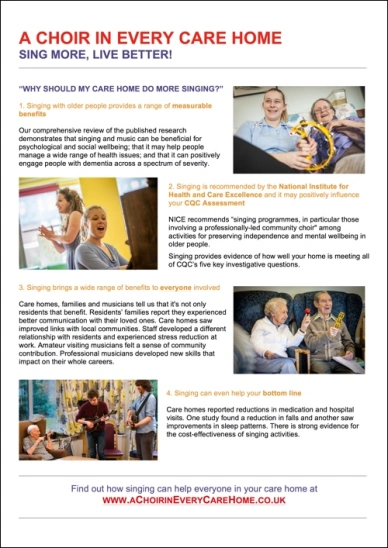The following ten ‘Headlines’ are a very quick summary of the mains findings from all our research, investigations and learnings. These all support the basic statement that care homes should all do more singing and music.
1. Singing benefits older people, including residents of care homes
It can be beneficial for psychological and social wellbeing, may help people to manage a range of health issues, including mental health challenges and physical health problems associated with chronic respiratory illness and Parkinson’s. And it can positively engage people across a spectrum of severity with dementia. More details can be found in the Research Review.
2. Care homes themselves can benefit from singing, too
Homes can benefit from having happier, calmer residents. Homes can use singing as favourable evidence in their CQC assessments. There were one or two reports of practical benefits too: a study found a reduction in falls; another noted reductions in medication and hospital visits ; and guidelines from NICE say that the cost-effectiveness evidence for singing is strong. More details can be found in our Research Review and Survey Results.
3. There are lots of ways to sing
Care homes told us about a huge variety of ways they brought music into their residents’ lives:
- Spontaneous singing, one-to-one or in a group
- Visiting musicians and facilitators
- Singalongs: planned activity to singalong CDs or other technology
- Visiting choirs
- Music therapy
- Home-grown Christmas shows and religious services
More details can be found in our Case Studies and Survey Results.
4. A “Singing Home” is the gold standard
Homes that sing, sing in lots of different ways. One home, we found, provided all the option listed above. Music provision in this home is characterised by:
- A plan, in which all the elements fit together for a purpose, including regular visiting musicians from a range of different backgrounds.
- Singing used for specific tasks
- Staff use singing naturally
- Singing is heard day in, day out.
More details can be found in our Case Studies.
5. Music leading needs to be of quality
No-one wants to be a poor leader or do bad singing. For singing work in care homes to be effective we argue that the quality that matters the most is the quality of outcomes for the residents. A “good” singing leader is one who supports appropriate outcomes for participants through musical activity. This requires knowledge, skills and understanding in a variety of aspects – social, personal, and approriate and wide ranging musical skills. More details in our working paper on Quality and Frameworks.
6. Music leaders need to be well-deployed
There is some evidence of a tight labour market, even with current demand. Yet musicians’ fees appear very low. At the same time, care homes are financially stretched. In classical economic terms this is an unusual situation, probably sustained by musicians’ belief in the importance of the work at the expense of their own fee rates. More details can be found in our Survey Results.
7. Musicians and care homes need to be prepared to go to scale
There are around 18,000 care homes in England. Over time, we want to enable a high proportion of these to have regular access to singing. Care homes tell us of the barriers to singing they perceive: lack of time, of money, and of expertise. Musicians say they have no spare capacity for additional work, nor the funding to carry it out. Both arts side and care side need to be ready for, and able to work towards, this great explosion of activity.
8. Musicians and care homes need to be able to buy and sell better
Some musicians we heard from were expert social entrepreneurs; they see business opportunities, find economies of scale that make the generally low fees paid for this work still attractive enough, and have marketing expertise that efficiently pulls in the work. Others find the business of marketing tough work and highly uneconomic. Care homes say that they don’t have the skills to know how to hire musicians. More details can be found in our Case Studies.
9. Issues around repertoire need clarifying
At the level of the individual music session, doing the singing is a relatively easy job. Perhaps the most pressing issue we heard about was repertoire (the songs we sing) which can be a difficulty for those not steeped in singing leader practice 8.1. The wide range of singing activities in care homes requires an eclectic range of repertoire, some of which may be easy to obtain, others more difficult. There were some reports of concerns over copyright and the use of song sheets, and debates about the appropriateness of repertoire. More details can be found in our Case Studies and discussion about Repertoire – what music to choose?
10. Scaled-up singing work must be sustained
It is important that any singing developments that are now undertaken should consider sustainability from the start. Ths is partly for reasons of equity; if, as we now know, singing is beneficial for older people, the opportunity to sing should be available to all, not just for a limited-time project but for the foreseeable future. It is partly a workforce issue: attracting, training and keeping singing leaders for this work makes sense only on a long-term basis. And it is a matter of economics: the type of large scale campaign envisaged here is not financially justifiable unless it leads to long-term change.
Please help us spread the message to all care homes by downloading and circulating this document, and telling people about our website.

